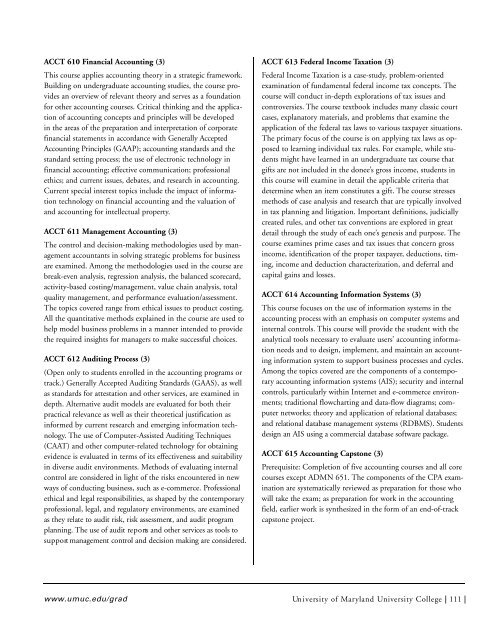A+B. Intro_SJ.1 - University of Maryland University College
A+B. Intro_SJ.1 - University of Maryland University College
A+B. Intro_SJ.1 - University of Maryland University College
Create successful ePaper yourself
Turn your PDF publications into a flip-book with our unique Google optimized e-Paper software.
ACCT 610 Financial Accounting (3)<br />
This course applies accounting theory in a strategic framework.<br />
Building on undergraduate accounting studies, the course provides<br />
an overview <strong>of</strong> relevant theory and serves as a foundation<br />
for other accounting courses. Critical thinking and the application<br />
<strong>of</strong> accounting concepts and principles will be developed<br />
in the areas <strong>of</strong> the preparation and interpretation <strong>of</strong> corporate<br />
financial statements in a c c o rdance with Generally Ac c e p t e d<br />
Accounting Principles (GAAP); accounting standards and the<br />
standard setting process; the use <strong>of</strong> electronic technology in<br />
financial accounting; effective communication; pr<strong>of</strong>essional<br />
ethics; and current issues, debates, and research in accounting.<br />
Current special interest topics include the impact <strong>of</strong> information<br />
technology on financial accounting and the valuation <strong>of</strong><br />
and accounting for intellectual property.<br />
ACCT 611 Management Accounting (3)<br />
The control and decision-making methodologies used by management<br />
accountants in solving strategic problems for business<br />
are examined. Among the methodologies used in the course are<br />
break-even analysis, regression analysis, the balanced scorecard,<br />
activity-based costing/management, value chain analysis, total<br />
quality management, and performance evaluation/assessment.<br />
The topics covered range from ethical issues to product costing.<br />
All the quantitative methods explained in the course are used to<br />
help model business problems in a manner intended to provide<br />
the required insights for managers to make successful choices.<br />
ACCT 612 Auditing Process (3)<br />
(Open only to students enrolled in the accounting programs or<br />
track.) Generally Accepted Auditing Standards (GAAS), as well<br />
as standards for attestation and other services, are examined in<br />
depth. Alternative audit models are evaluated for both their<br />
practical relevance as well as their theoretical justification as<br />
informed by current research and emerging information technology.<br />
The use <strong>of</strong> Computer-Assisted Auditing Techniques<br />
(CAAT) and other computer-related technology for obtaining<br />
evidence is evaluated in terms <strong>of</strong> its effectiveness and suitability<br />
in diverse audit environments. Methods <strong>of</strong> evaluating internal<br />
control are considered in light <strong>of</strong> the risks encountered in new<br />
ways <strong>of</strong> conducting business, such as e-commerce. Pr<strong>of</strong>essional<br />
ethical and legal responsibilities, as shaped by the contemporary<br />
pr<strong>of</strong>essional, legal, and regulatory environments, are examined<br />
as they relate to audit risk, risk assessment, and audit pro g r a m<br />
planning. The use <strong>of</strong> audit re p o rts and other services as tools to<br />
s u p p o rt management control and decision making are considere d .<br />
ACCT 613 Federal Income Taxation (3)<br />
Federal Income Taxation is a case-study, problem-oriented<br />
examination <strong>of</strong> fundamental federal income tax concepts. The<br />
course will conduct in-depth explorations <strong>of</strong> tax issues and<br />
controversies. The course textbook includes many classic court<br />
cases, explanatory materials, and problems that examine the<br />
application <strong>of</strong> the federal tax laws to various taxpayer situations.<br />
The primary focus <strong>of</strong> the course is on applying tax laws as opposed<br />
to learning individual tax rules. For example, while students<br />
might have learned in an undergraduate tax course that<br />
gifts are not included in the donee’s gross income, students in<br />
this course will examine in detail the applicable criteria that<br />
determine when an item constitutes a gift. The course stresses<br />
methods <strong>of</strong> case analysis and research that are typically involved<br />
in tax planning and litigation. Important definitions, judicially<br />
created rules, and other tax conventions are explored in great<br />
detail through the study <strong>of</strong> each one’s genesis and purpose. The<br />
course examines prime cases and tax issues that concern gross<br />
income, identification <strong>of</strong> the proper taxpayer, deductions, timing,<br />
income and deduction characterization, and deferral and<br />
capital gains and losses.<br />
ACCT 614 Accounting Information Systems (3)<br />
This course focuses on the use <strong>of</strong> information systems in the<br />
accounting process with an emphasis on computer systems and<br />
internal controls. This course will provide the student with the<br />
analytical tools necessary to evaluate users’ accounting information<br />
needs and to design, implement, and maintain an accounting<br />
information system to support business processes and cycles.<br />
Among the topics covered are the components <strong>of</strong> a contemporary<br />
accounting information systems (AIS); security and internal<br />
controls, particularly within Internet and e-commerce environments;<br />
traditional flowcharting and data-flow diagrams; computer<br />
networks; theory and application <strong>of</strong> relational databases;<br />
and relational database management systems (RDBMS). St u d e n t s<br />
design an AIS using a commercial database s<strong>of</strong>tware package.<br />
ACCT 615 Accounting Capstone (3)<br />
Prerequisite: Completion <strong>of</strong> five accounting courses and all core<br />
courses except ADMN 651. The components <strong>of</strong> the CPA examination<br />
are systematically reviewed as preparation for those who<br />
will take the exam; as preparation for work in the accounting<br />
field, earlier work is synthesized in the form <strong>of</strong> an end-<strong>of</strong>-track<br />
capstone project.<br />
w w w. u m u c . e d u / g r a d<br />
Un i versity <strong>of</strong> Ma r yland Un i versity <strong>College</strong> | 111 |

















